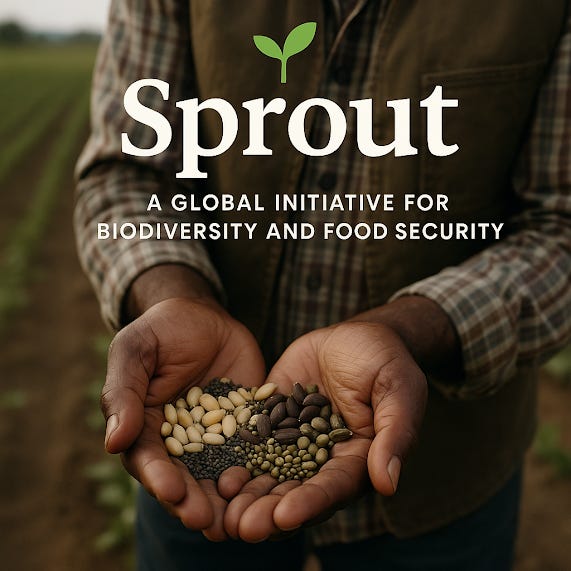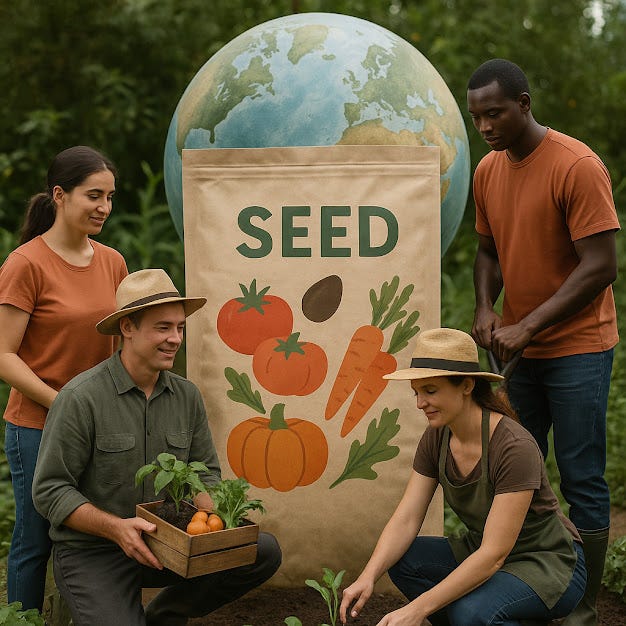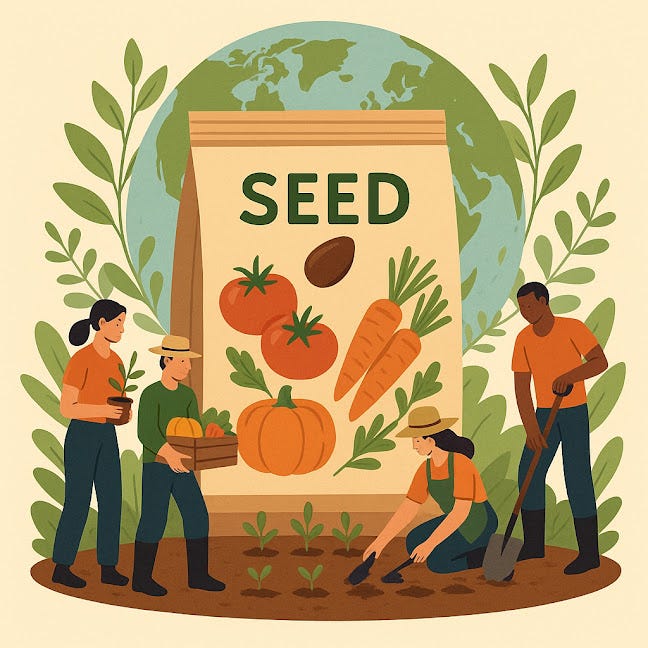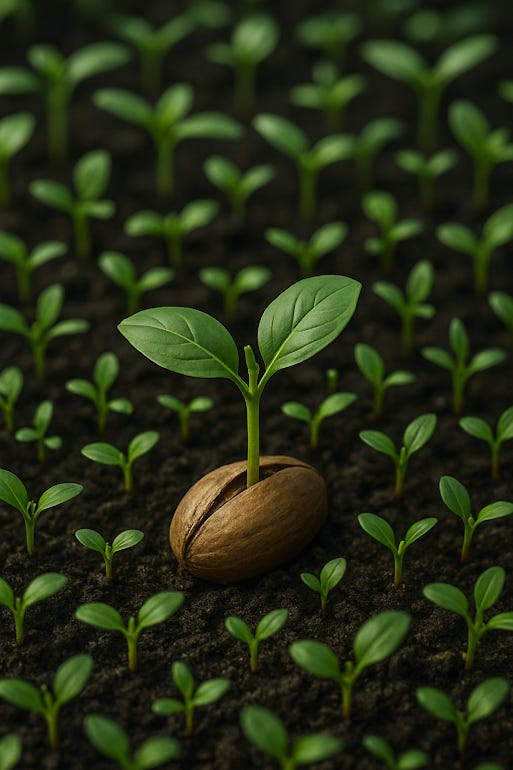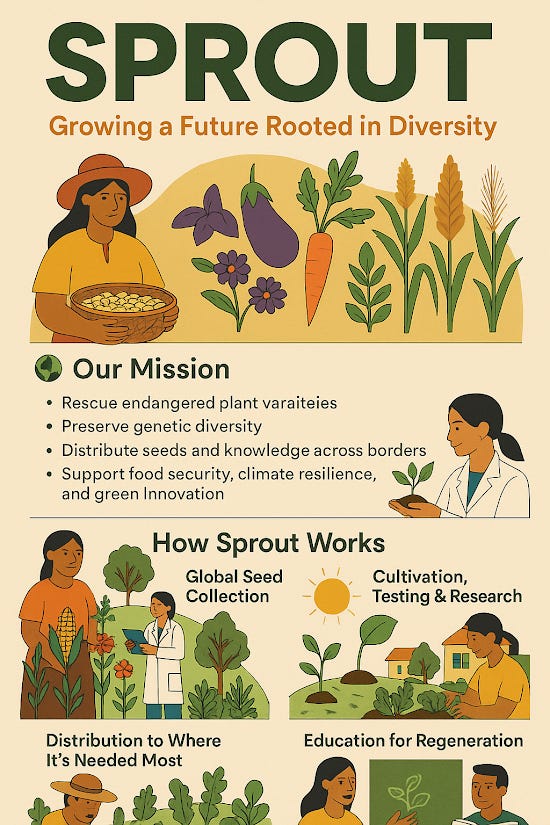Sprout: A Global Initiative for Biodiversity and Food Security
Sprout: A Global Initiative for Biodiversity and Food Security
In an era of escalating climate disruption, ecological collapse, and widespread food insecurity, Sprout rises as a transformative international movement. With a profound yet clear mission—to collect, preserve, and grow the world’s seeds—Sprout serves as a living bridge between ancestral knowledge and a resilient future. From edible crops to ornamental plants and bio-industrial species, Sprout is redefining agriculture as a tool for sustainability, justice, and global cooperation.
Mission and Purpose
Sprout’s mission is to ensure that no useful plant variety—edible, medicinal, ornamental, or industrial—is lost to time, conflict, or climate change. By developing a robust and decentralized international seed bank, cultivating plants for replanting, and distributing them globally, Sprout helps communities access the genetic and ecological diversity they need to thrive.
Sprout empowers:
Small farmers
Urban growers
Scientific communities
Educational institutions
Regions recovering from environmental or economic collapse
How It Works
1. Seed Collection
Sprout partners with:
Farmers and indigenous communities
Botanical gardens and seed conservatories
Universities and research institutions
Sprout collects and catalogs a wide range of seeds, with a focus on:
Fruits and vegetables
Grains and legumes
Garlic and tubers (e.g., potatoes)
Ornamental plants and flowers
Biomass and biofuel species
Medicinal herbs and cosmetic crops
Special attention is given to:
Heirloom and native varieties
Climate-resilient and endangered species
High-yield and high-nutrition cultivars
2. Cultivation and Research
Seeds are cultivated in both:
Controlled research facilities
Open field stations and climate-specific gardens
Agricultural scientists monitor:
Genetic integrity and biodiversity
Adaptability to varied climates
Disease resistance and pest resilience
Nutritional and medicinal properties
Cosmetic compound viability (e.g., oils, pigments, extracts)
Biomass and energy output for sustainable fuel
3. Global Distribution
Sprout distributes seeds and starter plants to:
Smallholder and family farms
Urban agriculture and permaculture projects
School and university gardens
Regions facing food insecurity or biodiversity loss
Biofuel co-ops and green energy start-ups
Natural medicine and botanical cosmetics initiatives
4. Education and Training
Sprout doesn’t stop at distribution—it builds knowledge networks through:
Workshops and training hubs
Online platforms with multilingual content
Guides for sustainable cultivation, harvesting, and seed saving
Special programs for women, youth, and indigenous leaders
Education spans both traditional agriculture and:
Medicinal plant use and cultivation
Biomass optimization for renewable energy
Natural dyes and cosmetic-grade plant extracts
Agroecological design and circular farming systems
Why It Matters
Sprout is more than a seed bank. It is a global resilience and equity platform that answers humanity’s most urgent challenges through nature-based solutions:
✅ Food Sovereignty
Communities control their own food systems, choosing what to grow and how to grow it.
✅ Climate Resilience
Access to diverse, climate-adapted seeds empowers adaptation to extreme weather.
✅ Health and Wellness
Medicinal and nutritious plants support self-care and public health in vulnerable regions.
✅ Sustainable Industry
Cosmetic and biomass-producing plants support local economies, replacing harmful synthetics and fossil fuels.
✅ Cultural Heritage
Ancestral seeds carry the stories, rituals, and wisdom of generations—Sprout protects them.
✅ Global Solidarity
Sprout fosters peace and collaboration by sharing life-sustaining resources without borders.
Future Vision
Sprout envisions a decentralized, open-access planetary network of:
Seed libraries and vaults
Local growing and research stations
Digital seed-sharing platforms
Community-led cultivation hubs
Education and innovation labs
This model creates a living, growing global commons—where seeds, plants, and knowledge flow freely to every continent, climate, and culture.
Conclusion
Sprout is not just about planting seeds. It’s about growing hope, resilience, and a thriving planet for all.
By protecting the smallest forms of life, Sprout cultivates a more biodiverse, equitable, and self-reliant world—from the soil to the city, and from the farmer’s field to the scientist’s lab.
Sprout: A Global Initiative for Biodiversity and Food Security
In a world where biodiversity is under constant threat and food security remains fragile, Sprout emerges as a critical global movement. With a simple yet powerful mission—to collect, preserve, and grow the world’s fruit, vegetable, grain, legume, garlic, and potato seeds—Sprout provides a living bridge between the past, present, and future of agriculture.
Mission and Purpose
Sprout’s mission is to ensure that no edible plant variety is lost to time, conflict, or climate change. By building a diverse, international seed bank and cultivating plants for direct distribution, Sprout empowers farmers, communities, and home growers with access to traditional, rare, and resilient crop varieties.
How It Works
Seed Collection
Partners with farmers, indigenous communities, researchers, and botanical institutions across all continents.
Focuses on heirloom, native, endangered, and climate-adaptive varieties—including vegetables, fruits, grains, legumes, garlic, and tubers like potatoes.
Cultivation and Research
Seeds are cultivated in both controlled environments and open fields to test viability and regional adaptability.
Agricultural scientists monitor genetic integrity, disease resistance, nutritional content, and crop yield to ensure long-term reliability and health benefits.
Global Distribution
Seeds and starter plants are distributed to:
Smallholder farmers
Community gardens
Urban agriculture projects
Schools and educational institutions
Regions suffering from biodiversity loss or food insecurity
Education and Training
Offers accessible training on sustainable agriculture, seed saving, and biodiversity restoration.
Hosts hands-on workshops and online learning hubs to support communities in growing, harvesting, and preserving seeds—building regenerative local food systems.
Why It Matters
Sprout is more than a seed bank—it is a global safety net and a movement for food justice. It ensures:
Food Sovereignty – empowering communities to produce their own food independently.
Climate Resilience – enabling agriculture to adapt to droughts, floods, heat, and shifting seasons.
Cultural Heritage – protecting traditional varieties and the wisdom of generations.
Global Cooperation – uniting diverse regions through the simple, powerful act of sharing life-sustaining seeds.
Future Vision
Sprout envisions a decentralized international network of growing stations, seed libraries, and educational hubs. Through open-access digital platforms and grassroots partnerships, Sprout will make diverse plant varieties—and the knowledge to grow them—available to everyone, everywhere.
By protecting the smallest life forms, Sprout helps grow a more resilient, equitable, and nourished planet.
Seed: A Global Initiative for Biodiversity and Food Security
In a world where biodiversity is under constant threat and food security is a growing concern, Seed emerges as a vital international organization with a simple yet powerful mission: to collect, preserve, and grow the world’s fruit and vegetable seeds for global distribution.
Mission and Purpose
Seed’s mission is to ensure that no edible plant variety is lost to time, conflict, or climate change. By building a diverse, international seed bank and cultivating plants for direct distribution, Seed helps farmers, communities, and home growers access a wide range of fruits and vegetables—both traditional and rare.
How It Works
Seed Collection
Partnering with farmers, indigenous groups, researchers, and botanical gardens, Seed identifies and collects seeds from all continents.
Special focus is placed on heirloom, endangered, and climate-resilient varieties.
Cultivation and Research
Seeds are grown in controlled facilities and open gardens to test viability, study adaptability, and produce healthy plant stock.
Agricultural scientists ensure genetic integrity and monitor disease resistance, yield, and nutritional value.
Global Distribution
Plants and seeds are distributed to communities, small farmers, urban agriculture projects, schools, and governments.
Priority is given to regions facing food insecurity, loss of biodiversity, or climate-related crop failures.
Education and Training
Seed also runs educational programs on sustainable farming, seed saving, and biodiversity.
Workshops and online platforms help recipients learn how to grow, harvest, and save their own seeds.
Why It Matters
Seed is not just preserving plants—it’s preserving heritage, health, and the right to grow food. In doing so, it supports:
Food sovereignty
Climate adaptation
Cultural preservation
Global cooperation
Future Vision
Seed aims to expand into a decentralized network of growing hubs and seed libraries in every region. Using both physical and digital platforms, the organization envisions an open-access model where seeds—and knowledge—are shared without borders.
Seed: A Global Initiative for Biodiversity and Food Security
In a world where biodiversity is under constant threat and food security is a growing concern, Seed emerges as a vital international organization with a simple yet powerful mission: to collect, preserve, and grow the world’s fruit, vegetable, grain, legume, garlic, and potato seeds for global distribution.
Mission and Purpose
Seed’s mission is to ensure that no edible plant variety is lost to time, conflict, or climate change. By building a diverse, international seed bank and cultivating plants for direct distribution, Seed empowers farmers, communities, and home growers to access a wide range of crops—both traditional and rare.
How It Works
Seed Collection
Partners with farmers, indigenous groups, researchers, and botanical gardens across all continents.
Focuses on heirloom, endangered, native, and climate-resilient varieties, including vegetables, fruits, grains, legumes, garlic, and tubers like potatoes.
Cultivation and Research
Seeds are grown in controlled environments and open fields to test viability and adaptability.
Agricultural scientists study genetic integrity, yield, disease resistance, and nutritional content to ensure high-quality results.
Global Distribution
Seeds and starter plants are distributed to:
Small farmers
Community gardens
Urban agriculture projects
Schools and educational institutions
Regions affected by food insecurity or environmental degradation
Education and Training
Offers programs on sustainable agriculture, seed saving, and biodiversity conservation.
Hosts workshops and maintains online platforms to teach people how to grow, harvest, and save seeds—creating self-sufficient ecosystems.
Why It Matters
Seed is more than a seed bank—it’s a movement to preserve humanity’s right to grow food, sustain culture, and adapt to a changing planet. It supports:
Food sovereignty — empowering local food production and reducing dependency.
Climate resilience — ensuring access to crops that can survive changing conditions.
Cultural heritage — safeguarding traditional plant varieties and agricultural knowledge.
Global cooperation — building networks of solidarity through the simple act of sharing seeds.
Future Vision
Seed envisions a decentralized global network of seed hubs, growing stations, and open-access libraries. Through digital platforms and community-driven systems, Seed will make plant varieties—and the knowledge to grow them—available to all, crossing borders and building resilience from the
Sprout: A Global Initiative for Biodiversity and Food Security
In an era marked by ecological decline and growing food insecurity, Sprout rises as a transformative global initiative. Its purpose is simple but profound: to collect, preserve, and cultivate seeds of edible plants—fruits, vegetables, grains, legumes, garlic, and tubers—for global distribution and resilience.
Mission and Purpose
Sprout’s mission is to ensure that no edible plant variety is lost due to time, conflict, environmental degradation, or climate change. By creating an international seed bank and cultivating plants for direct distribution, Sprout empowers communities, small-scale farmers, and home growers to reclaim food sovereignty and agricultural diversity.
How It Works
Seed Collection
Sprout partners with:
Local farmers and seed savers
Indigenous communities
Botanical gardens
Agricultural researchers
Its focus includes heirloom, rare, endangered, native, and climate-resilient varieties—ensuring that global biodiversity is not only preserved, but strengthened.
Cultivation and Research
Seeds are tested and grown in both:
Controlled research environments
Open gardens and regional trial plots
This phase allows Sprout’s agricultural scientists to monitor:
Viability and adaptability to various climates
Resistance to pests and diseases
Nutritional value and yield consistency
Genetic integrity and natural variation
Global Distribution
Sprout distributes seeds and plant stock to:
Smallholder and family farms
Urban and rural community gardens
School gardens and agricultural training centers
Regions recovering from climate disasters or food shortages
Education and Training
Sprout offers accessible education to recipients and the public through:
Workshops and demonstration farms
Online learning platforms and seed-saving tutorials
Printed guides and multilingual materials
The goal: empower people not just to receive seeds, but to regenerate, multiply, and share them—forming closed-loop, community-based systems of resilience.
Why It Matters
Sprout is more than a seed bank. It’s a global movement to protect life, empower communities, and safeguard the future. It addresses four urgent global needs:
Food Sovereignty
Giving individuals and communities control over their food systems and crop selection.Climate Resilience
Ensuring availability of seeds that can withstand heatwaves, droughts, floods, and shifting seasons.Cultural Preservation
Protecting traditional crop varieties and the ancestral knowledge embedded in them.Global Solidarity
Promoting peace and cooperation through open, borderless access to life-giving resources.
Future Vision
Sprout envisions a decentralized, open-access global network of:
Regional growing stations
Seed libraries
Digital seed-sharing platforms
Community-led hubs for cultivation, education, and exchange
Through this model, Sprout will make plant diversity and agricultural knowledge accessible to everyone—across continents, economies, and climates.
Sprout is not just about planting seeds. It's about growing a future where biodiversity thrives, people are fed, and communities are empowered to flourish.
Sprout: Growing a Future Rooted in Diversity
Across every continent, in valleys and deserts, forests and fields, plants have fed, healed, and sustained humanity for thousands of years. But today, many of these life-giving species are vanishing—lost to monocultures, climate extremes, and neglect. Sprout was born to reverse that trend.
Sprout is a global seed and cultivation initiative dedicated to protecting and reviving the world’s plant diversity—from everyday vegetables to wild herbs, medicinal roots, flowering ornamentals, and energy crops. It is a call to action: to preserve the plants that nourish the planet and all who live on it.
🌱 Our Mission
At its core, Sprout exists to:
Rescue endangered plant varieties
Preserve genetic diversity
Distribute seeds and knowledge across borders
Support food security, climate resilience, and green innovation
Whether it’s a forgotten grain from the Andes, a drought-proof legume from the Sahel, a healing flower from the Himalayas, or a high-yield biomass plant for biofuel, Sprout is committed to saving and sharing every useful species before it disappears.
🔍 How Sprout Works
1. Global Seed Collection
We work with:
Indigenous seed keepers and farmers
Ecologists, botanists, and plant breeders
Research institutes and conservation gardens
Our collection includes:
Edible crops (vegetables, grains, legumes, tubers, fruits, herbs)
Ornamental plants and flowers
Medicinal and aromatic plants
Industrial crops (biofuels, cosmetics, dyes, fibers)
2. Cultivation, Testing & Research
Seeds are not just stored—they are grown. In greenhouses, climate chambers, and open test plots, we evaluate:
Viability and adaptability
Resistance to pests, disease, and drought
Nutritional, medicinal, or industrial value
Sustainable yield and regenerative potential
This hands-on approach ensures that when seeds are shared, they’re ready to thrive in real-world conditions.
3. Distribution to Where It’s Needed Most
Sprout delivers seeds and seedlings to:
Small farms and regenerative agriculture projects
Urban gardens and community food forests
Disaster-struck and food-insecure regions
Schools, educational farms, and training programs
Initiatives for natural medicine, green cosmetics, and clean energy
4. Education for Regeneration
Our work doesn’t end with seeds—we empower communities to grow independently through:
Workshops and field schools
Seed-saving tutorials
DIY guides for soil health, organic farming, and permaculture
Open-source digital learning tools
Sprout teaches people not just how to plant—but how to restore ecosystems, reclaim food traditions, and power sustainable economies.
🌍 Why Sprout Matters
In a world facing climate breakdown, inequality, and ecological collapse, Sprout offers tangible hope. It is:
A global safety net for plant life
A tool for food sovereignty
A guardian of cultural memory
A platform for green entrepreneurship
We cannot depend on a handful of crops grown in monocultures. The future must be diverse—biologically, culturally, economically. Sprout is making that future possible.
🔮 Our Vision
Sprout dreams of a world connected by living systems of abundance:
A seed library in every region
A garden in every school
A growing station in every climate zone
A digital map of open-source seeds and growing guides
A future where no plant—or person—is left behind
From food to fuel, from medicine to beauty, Sprout is unlocking the full potential of the plant kingdom. Not for profit. Not for control. But for life.
Sprout is how we begin again—with seeds in our hands, soil beneath our feet, and the promise of regeneration in every harvest.



